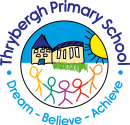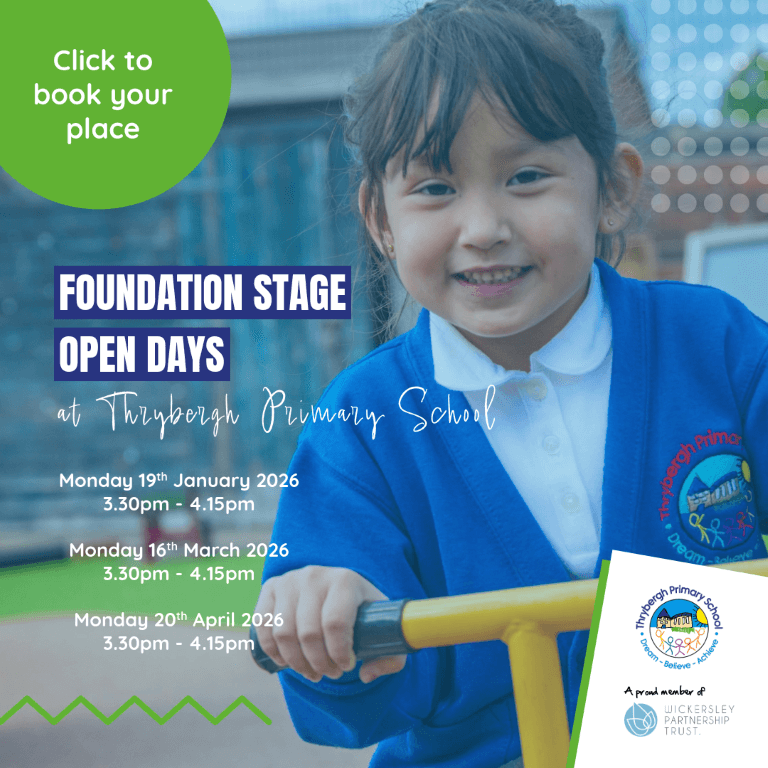Reading & Phonics
What is Phonics?
Phonics is a way of teaching children how to read and write. It helps children hear, identify and use different sounds that distinguish one word from another in the English language.
Written language can be compared to a code, so knowing the sounds of individual letters and how those letters sound when they’re combined will help children decode words as they read. Understanding phonics will also help children know which letters to use when they are writing words.
Phonics involves matching the sounds of spoken English with individual letters or groups of letters. For example, the sound k can be spelled as c, k, ck or ch.
Teaching children to blend the sounds of letters together helps them decode unfamiliar or unknown words by sounding them out. For example, when a child is taught the sounds for the letters t, p, a and s, they can start to build up the words: “tap”, “taps”, “pat”, “pats” and “sat”.
Phonics
At Thrybergh Primary, we teach phonics through Little Wandle Letters and Sounds Revised, which is a fully validated systematic synthetic phonics programme. We start teaching daily phonics as soon as children start in Foundation Stage 1 following the Little Wandle Letters and Sounds Revised progression, which ensures children build on their growing knowledge of the alphabetic code, mastering phonics to read and spell as they move through school.
Every teacher in our school has been trained to teach phonics using this programme, so we have the same expectations of progress. We all use the same language, routines and resources to teach children to read so that we lower children’s cognitive load.
Reading books
Children who are accessing the Little Wandle phonics programme in school will be regularly assessed. These assessments provide us with an accurate picture of where the child is with their phonics and reading enabling us to select an appropriately matched phonetically decodable book for your child to read in school and take home. We expect children to practise reading their book at home at least 3 times a week in order to build fluency and share success. Reading for pleasure books or ‘Snuggly Up Books’ also go home for parents to share and read to children. These books are chosen weekly by children from our school or class library shelves.
Information for Parents
We’re excited to share that we’ve moved away from traditional paper reading diaries and are now using BOOMREADER, a simple and convenient electronic system to record your child’s reading.
With BOOMREADER, you can log books quickly, keep track of progress more easily, and celebrate your child’s achievements all in one place. It’s designed to make life easier for families while helping us work together to support children’s reading journeys.
To get started, please take a look at our helpful resources below:
The resources on this page will help you support your child with saying their sounds and writing their letters. There are also some useful videos so you can see how they are taught at school and feel confident about supporting their reading at home.
We also run parent workshops to help parents understand how phonics is taught in school and how you can help at home.
Phonics and Reading Interventions
Assessment is used to identify children in KS1 and EYFS who are falling behind. These children may require daily Keep-Up Support, either individually or in a small group. Gaps are quickly identified through assessment and short interventions are delivered based on the children’s needs.
Children who still require phonics in KS2 are taught following the Little Wandle Rapid Catch-up Intervention programme. Rapid Catch-up is a complete catch-up programme that mirrors the main phonics programme but has a faster pace. It has been created to help children catch up quickly. These children also receive additional 1-1 reading sessions.
Additionally, we run a fluency intervention which targets children who have exited the phonics programme, but still require support with fluency and prosody. In these sessions, adults use echo reading to model and encourage accurate reading. Children practice reading texts aloud to build intonation and rhythm within reading.
Our Curriculum in Detail
Find out more
If you would like to find out more about our curriculum or have any queries please contact Mrs R Parry-McDermott, Headteacher, using our contact details.


